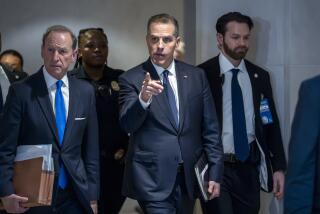Rush to judgment
- Share via
The shocking shootings at Ft. Hood -- and whether they exposed gaps in the monitoring of radicalized members of the U.S. armed forces -- are both suitable subjects for investigation. But a Senate hearing hastily scheduled for today to provide a “preliminary assessment” of the tragedy is premature and seems politically inspired. And, thanks to the Obama administration’s understandable unwillingness to have its investigators testify about the ongoing case, the hearing is unlikely to be enlightening even about their tentative conclusions. So anyone who expects definitive answers from this supposedly urgent exercise will likely end up seeing it as another example of Washington’s cluelessness.
Today’s hearing by the Homeland Security and Governmental Affairs Committee was meant to fulfill a promise by the panel’s chairman, Sen. Joe Lieberman (I-Conn.), that he would try to ascertain the motives of Maj. Nidal Malik Hasan, the Army psychiatrist who allegedly went on a rampage at the Texas facility on Nov. 5, and whether the Army “missed warning signs that should have led them to essentially discharge him.” But those questions are already being asked by the military justice system, which has charged Hasan with 13 counts of murder, and by the Pentagon and intelligence community.
Results of those investigations might well provide the basis for future congressional hearings that would focus on established facts in the Hasan case and what they might reveal about accusations that the military is insufficiently vigilant about “homegrown” extremism, Islamic or otherwise. Congress also would be within its rights to hold hearings if the executive branch bungled its investigations or, as occurred with Watergate, actually covered up wrongdoing.
But today’s hearing is unlikely to satisfy. It won’t feature much senatorial sleuthing, not only because of the absence of government witnesses but also because Lieberman, rightly, says he won’t question witnesses to the shootings. Thus, the hearing can’t shed much light on whether Hasan was, in Lieberman’s words, an “Islamist extremist.”
It’s possible that the outside experts who testify today will illuminate some general issues connected with extremism in the military or offer intriguing speculation about Hassan’s possible intentions, much as commentators in the media have done. But how much specific information is likely to come from a New York police official, a retired soldier and a former advisor to George W. Bush who is currently a CNN contributor? Given the constraints on the committee, Lieberman’s rush to pick up the gavel strikes us as a case of “don’t just stand there -- chair something.”
More to Read
Get the L.A. Times Politics newsletter
Deeply reported insights into legislation, politics and policy from Sacramento, Washington and beyond. In your inbox twice per week.
You may occasionally receive promotional content from the Los Angeles Times.










